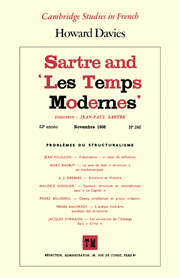Book contents
- Frontmatter
- Contents
- GENERAL EDITOR'S PREFACE
- Preface
- Acknowledgements
- Introduction
- 1 The first six years: the participation of Leiris and Lévi-Strauss
- 2 From 1951 to 1956: the rise of structuralism
- 3 Algeria: intellectual rivalries in time of war
- 4 The critique of academic knowledge
- Conclusion
- Appendix 1 Composition of the Editorial Board
- Appendix 2 Circulation figures
- Appendix 3 Categories of material to be found in Les Temps Modernes
- Appendix 4 Articles pertaining to academic anthropology
- Appendix 5 Special issues
- Notes
- Select bibliography
- Name index
- Subject index
- Cambridge Studies in French
- Frontmatter
- Contents
- GENERAL EDITOR'S PREFACE
- Preface
- Acknowledgements
- Introduction
- 1 The first six years: the participation of Leiris and Lévi-Strauss
- 2 From 1951 to 1956: the rise of structuralism
- 3 Algeria: intellectual rivalries in time of war
- 4 The critique of academic knowledge
- Conclusion
- Appendix 1 Composition of the Editorial Board
- Appendix 2 Circulation figures
- Appendix 3 Categories of material to be found in Les Temps Modernes
- Appendix 4 Articles pertaining to academic anthropology
- Appendix 5 Special issues
- Notes
- Select bibliography
- Name index
- Subject index
- Cambridge Studies in French
Summary
From 1971 to TM's fortieth anniversary in October 1985 – these years represent the longest of the five periods that I have identified. There are a number of reasons for assigning the greatest amount of material to the smallest space and I shall amplify these in the course of this conclusion. The reasons are the following: first, the influence of Sartre and Gorz diminishes quite rapidly from the mid-seventies and the theoretical, if not the political, parameters of the synthetic anthropology become much less easy to discern; secondly, the editorial presence of Pouillon yields very little academic anthropology; thirdly, only one contributor, Jeanne Favret-Saada, advances significantly along the royal road of reflexivity explored by Sartre and Leiris.
In the last nine years of his life, Sartre's profile in TM is low. In July/August 1979 he discusses with Daniel Cohn-Bendit and Alice Schwartzer the importance of guilt in the outlook of the West Germans, and in September 1979 he chairs an Israeli–Palestinian colloquium organised, with difficulty, by Pierre Victor. A terse note, the last, in March 1980, warns readers to avoid articles by Serge Thion, suspected of endorsing denials of Nazi genocide. His only sustained statement of views is the bluntly monitory ‘Elections, piège à cons’ (January 1973), which appropriately reiterates, through the prism of the Critique, the denunciation of the analytic character of liberal democracy first rehearsed in the ‘Presentation’ of 1945.
- Type
- Chapter
- Information
- Sartre and 'Les Temps Modernes' , pp. 203 - 214Publisher: Cambridge University PressPrint publication year: 1987

